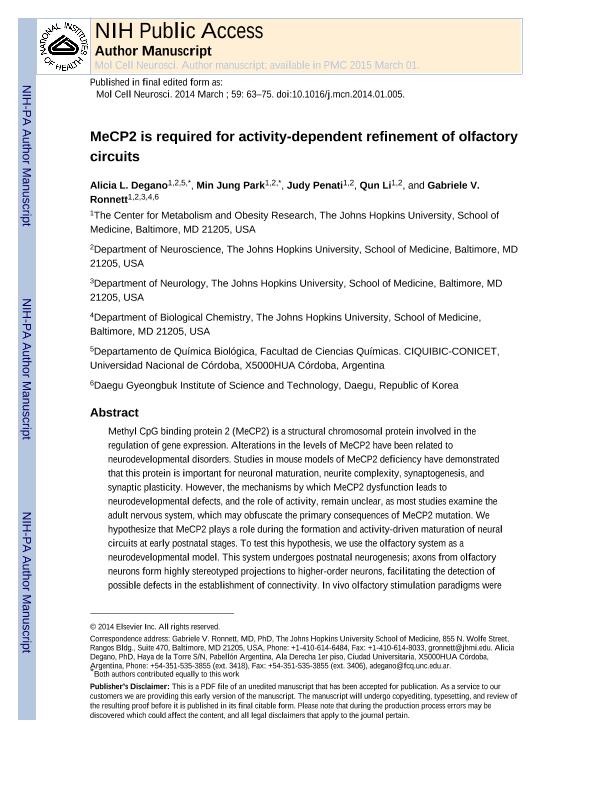Mostrar el registro sencillo del ítem
dc.contributor.author
Degano, Alicia Laura

dc.contributor.author
Park, Min Jung
dc.contributor.author
Penatti, Judith
dc.contributor.author
Li, Qun
dc.contributor.author
Ronnett, Gabriele
dc.date.available
2018-01-03T13:28:09Z
dc.date.issued
2014-01
dc.identifier.citation
Degano, Alicia Laura; Park, Min Jung; Penatti, Judith; Li, Qun; Ronnett, Gabriele; MeCP2 is required for activity-dependent refinement of olfactory circuits; Academic Press Inc Elsevier Science; Molecular and Cellular Neuroscience; 59; 1-2014; 63-75
dc.identifier.issn
1044-7431
dc.identifier.uri
http://hdl.handle.net/11336/32096
dc.description.abstract
Methyl CpG binding protein 2 (MeCP2) is a structural chromosomal protein involved in the regulation of gene expression. Alterations in the levels of MeCP2 have been related to neurodevelopmental disorders. Studies in mouse models of MeCP2 deficiency have demonstrated that this protein is important for neuronal maturation, neurite complexity, synaptogenesis, and synaptic plasticity. However, the mechanisms by which MeCP2 dysfunction leads to neurodevelopmental defects, and the role of activity, remain unclear, as most studies examine the adult nervous system, which may obfuscate the primary consequences of MeCP2 mutation. We hypothesize that MeCP2 plays a role during the formation and activity-driven maturation of neural circuits at early postnatal stages. To test this hypothesis, we use the olfactory system as a neurodevelopmental model. This system undergoes postnatal neurogenesis; axons from olfactory neurons form highly stereotyped projections to higher-order neurons, facilitating the detection of possible defects in the establishment of connectivity. In vivo olfactory stimulation paradigms were used to produce physiological synaptic activity in gene-targeted mice in which specific olfactory circuits are visualized. Our results reveal defective postnatal refinement of olfactory circuits in Mecp2 knock out (KO) mice after sensory (odorant) stimulation. This failure in refinement was associated with deficits in the normal responses to odorants, including brain-derived neurotrophic factor (BDNF) production, as well as changes in adhesion molecules known to regulate axonal convergence. The defective refinement observed in Mecp2 KO mice was prevented by daily treatment with ampakine beginning after the first postnatal week. These observations indicate that increasing synaptic activity at early postnatal stage might circumvent the detrimental effect of MeCP2 deficiency on circuitry maturation. The present results provide in vivo evidence in real time for the role of MeCP2 in activity-dependent maturation of olfactory circuitry, with implications for understanding the mechanism of MeCP2 mutations in the development of neural connectivity.
dc.format
application/pdf
dc.language.iso
eng
dc.publisher
Academic Press Inc Elsevier Science

dc.rights
info:eu-repo/semantics/openAccess
dc.rights.uri
https://creativecommons.org/licenses/by-nc-sa/2.5/ar/
dc.subject
Olfactory Circuitry
dc.subject
Mecp2
dc.subject
Neurodevelopment
dc.subject
Autism Spectrum Disorder
dc.subject
Rett Syndrome
dc.subject.classification
Otras Ciencias Biológicas

dc.subject.classification
Ciencias Biológicas

dc.subject.classification
CIENCIAS NATURALES Y EXACTAS

dc.subject.classification
Inmunología

dc.subject.classification
Medicina Básica

dc.subject.classification
CIENCIAS MÉDICAS Y DE LA SALUD

dc.title
MeCP2 is required for activity-dependent refinement of olfactory circuits
dc.type
info:eu-repo/semantics/article
dc.type
info:ar-repo/semantics/artículo
dc.type
info:eu-repo/semantics/publishedVersion
dc.date.updated
2017-12-28T17:46:13Z
dc.journal.volume
59
dc.journal.pagination
63-75
dc.journal.pais
Estados Unidos

dc.journal.ciudad
San Diego
dc.description.fil
Fil: Degano, Alicia Laura. University Johns Hopkins; Estados Unidos. Consejo Nacional de Investigaciones Científicas y Técnicas. Centro Científico Tecnológico Conicet - Córdoba. Centro de Investigaciones en Química Biológica de Córdoba. Universidad Nacional de Córdoba. Facultad de Ciencias Químicas. Centro de Investigaciones en Química Biológica de Córdoba; Argentina
dc.description.fil
Fil: Park, Min Jung. University Johns Hopkins; Estados Unidos
dc.description.fil
Fil: Penatti, Judith. University Johns Hopkins; Estados Unidos
dc.description.fil
Fil: Li, Qun. University Johns Hopkins; Estados Unidos
dc.description.fil
Fil: Ronnett, Gabriele. University Johns Hopkins; Estados Unidos. Daegu Gyeongbuk Institute of Science and Technology. Daegu; Corea del Sur
dc.journal.title
Molecular and Cellular Neuroscience

dc.relation.alternativeid
info:eu-repo/semantics/altIdentifier/url/http://www.sciencedirect.com/science/article/pii/S1044743114000062
dc.relation.alternativeid
info:eu-repo/semantics/altIdentifier/doi/http://dx.doi.org/10.1016/j.mcn.2014.01.005
dc.relation.alternativeid
info:eu-repo/semantics/altIdentifier/url/https://www.ncbi.nlm.nih.gov/pmc/articles/PMC4008654/
Archivos asociados
